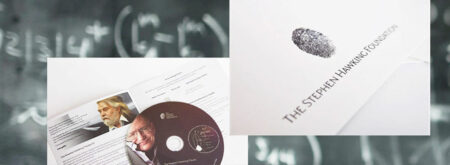
Ten years ago, Stephen Hawking made a bet with the man in the office next door at Cambridge University: South Africa’s Neil Turok, the son of ANC MP Ben Turok.
The iconic scientist balked at Turok’s proposal for a money wager, so they agreed on another kind of stake: bragging rights over which of them had discovered the true story of how both creation and time began.
Their bet — which boils down a complex debate — was supposed to be settled by the Planck science satellite, which released its “spectacular” batch of data last month. Instead, the analysis of the data has left Turok fuming.
Hawking champions the standard big bang “inflation” theory, which says space and time began 13,72bn years ago, and that Albert Einstein’s laws did not apply to the first bizarre moments of creation. (Actually, last month, Planck adjusted our cosmic age to 13,8bn, which means two-thirds of the water in your glass — the hydrogen part — is 80-million years older than you might have thought.)
But Turok, together with his collaborator Dr Paul Steinhardt, insists our universe is the child born of a dead parent universe and that there was no beginning at all.
Turok and Steinhardt achieved global scientific recognition when their equations suggested that their theory was not only mathematically correct, but also explained “what banged” in the big bang.
Accepting Turok’s “cyclic” model is like Neo from The Matrix choosing the red pill. First, it would mean that whole, perhaps trillion-year-old universes have already lived and died, giving ample time for “alien” civilisations to have risen and developed to unimaginable levels of sophistication, or self-destruction, long before history itself.
More startlingly, the maths equations imply that we’re all really living not only in three dimensions (up-down; left-right; back-and-forward), but also in an additional seven — most of which are too small to see, and one of which is an invisible membrane we’re actually living on. It suggests everything in our ancient parent universe accelerated to the speed of light, causing these geometric structures to collide in what we know as the Big Bang.
Hawking’s problem was that an earlier satellite, called WMAP, showed that the universe is almost exactly the same temperature everywhere you look — and 13,8bn years is far too little time for the heat from the Big Bang explosion to have spread so evenly in such a vast space.
The Planck satellite was launched partly to look for evidence of a bizarre phenomenon which could have forced this heat to the far corners of the cosmos. If Planck discovered “gravitational waves” — stretch marks from a weird growth spurt in the early universe — they agreed Turok (and Einstein) would be wrong, and Hawking vindicated.
Last month, the Planck scientific team admitted they had found no such waves.
But Turok — who lived in exile with his parents in East Africa and studied at British universities, eventually becoming chair of mathematical physics at Cambridge University — has received no contrite phone call from Hawking.
Recently reappointed as director of the Perimeter Institute for Theoretical Physics in Canada, a research centre founded by the billionaire creator of the BlackBerry, Mike Lazaridis, Turok is working on what is arguably the world’s largest effort to create a quantum computer: the weird and almost infinitely more powerful potential replacement for digital technology.
Although he stresses that Hawking remains “a great friend”, the Johannesburg-born cosmologist — who lives with his wife in the technology corridor town of Waterloo, Ontario — was clearly annoyed with “spin” from the Planck team that appears to have scuppered their bet.
Despite failing to detect the cosmic stretch marks, the Planck scientists have reported that other data support Hawking’s inflation model.
Turok insists the evidence “quite clearly” does the opposite, and affirms his own model.
“The Planck collaboration has completely misrepresented the implications of the data for the cyclic model, and my collaborator is currently completing two papers [in response],” said Turok.
“We have these spectacular results from the Planck satellite — what they are telling us is that the universe is unbelievably simple, and beautiful and elegant. The inflationary theory is not beautiful — it is horribly contrived; it doesn’t deal with the big problem, which is the big bang singularity. And the data rules out 99% of the ad hoc models that make up that model.”
At a seminar in California last week, Hawking skirted the issue, focusing instead on the satellite’s measurements of the mysterious “dark energy” force.
An expert from the Waterford Institute of Technology, Cormac O’Rafferty, told Forbes magazine that any discovery of “non-random fluctuations” in the background heat in the cosmos would have boosted Turok’s ground-breaking model but that Planck’s failure to find them made the theory “less likely”.
It seems the truth of our beginning — and the scale of Turok’s intellectual legacy — may have to wait at least until Planck’s comprehensive data release next year. — (c) 2013 Mail & Guardian
- Visit the Mail & Guardian Online, the smart news source




